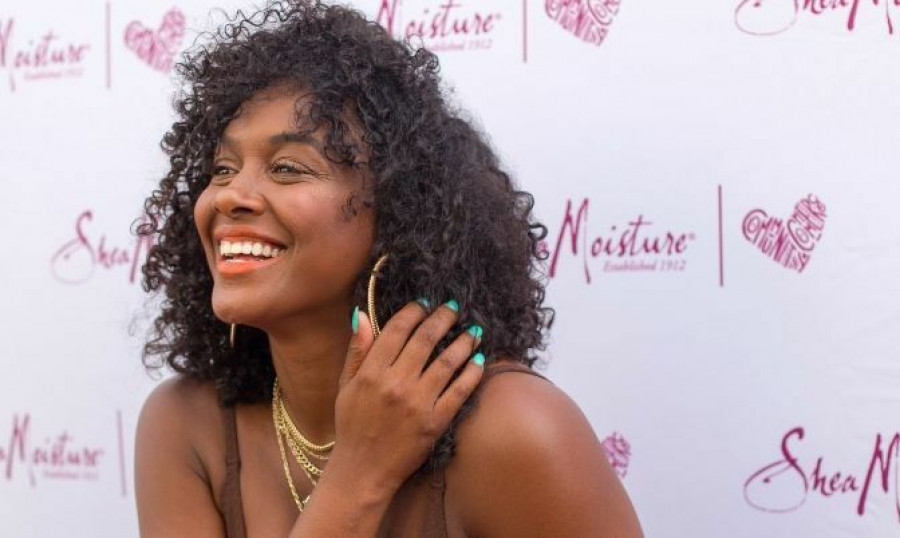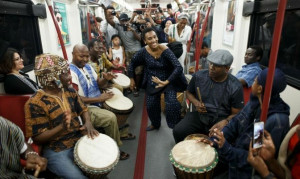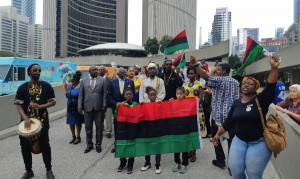With an impressive line-up of speakers, community leaders, artists and vendors, the pre-Caribbean Carnival Pop-up was everything Black women needed right now to be seen, heard and celebrated.
Over four-days the two-floor venue at 128 Peter Street was transformed into a safe space for women of colour to talk about their hair; and not just how to style it, but how it made them feel, impacted their life experiences, and their self-love journey with their hair. The panelists were authentic, transparent and insightful as they shared their experiences as Black bodies in mainstream media.
Nneka Elliot, former CP24 News correspondent, turned actress and beauty blogger coined a term I have never heard before “Hairism”-- meaning discrimination of hair, based on the idea that some hair textures are superior to others. I enjoyed hearing and learning about the various perspectives of hair experiences Black women face. It made me realize that I am not the only one feeling this way about my hair.
At the Shea Moisture Pop-up Launch Party, Canadian artist Jully Black had the whole venue rocking and singing along, as Black women were celebrated through the magic of a Jully Black performance.
Before the celebrations started, I had the chance to ask some VIP’s a few questions on the coral carpet.
Cyrus, What does it mean for Shea Moisture brand to be in Canada, and what was the motivation behind the pop-up events in Toronto?
Cyrus Dennis, co-founder Shea Moisture: The opportunity for us to come into the Canadian market was driven by our community here in Canada, who has been engaging us and asking us to come. Over the last year, we made a commitment to really service and engage our community here because they are a part of us, and they have supported us for many, many years. So this was an opportunity for us to come into the marketplace and bring products that make sense for the Canadian consumer and really engage in a meaningful way. This Shea Moisture pop-up is really a celebration. We chose dates right before the Toronto Caribbean Carnival, as an opportunity to come out and really engage the community and celebrate our diversity, and celebrate Shea Moisture being here because we plan to be here for a long time.
What does it mean for Shea Moisture with the new ownership?
Cyrus Dennis: For the Dennis family and the Shea Moisture family, we are now part of a greater global family of Unilever, and that allows us to elevate and expand the global reach of the brand. We are opening new markets across the world, and that’s where we are focused. There are so many women across the world who are underserved, who want a natural alternative that is healthy for them. So we are starting to see that international growth happen for us.
Jully, how has your hair affected your brand and your life outside of being an artist?
Jully Black, recording artist: Hair tells a story whether you are wearing your natural hair, weave or a wig. Your hair tells a story of where you are emotionally and spiritually. If we follow the coil, it will tell us where we came from and where we are going.
I recently experienced some hormonal changes in my body, and as a result, the hair that reached the middle of my back began to thin. I went natural back in 2000 and cut off all the perm. So when my hair started thinning this year, I felt my identity was changing. I had to pause and unpack my feelings. Why did I feel less beautiful? The choice of our hair is ours to make. Confidence is currency; build your wealth in confidence. I say invest in your health and beauty holistically, that’s the way I am living my life. I like that the Shea Moisture products are natural; I use raw Shea all over my body.
Tracy, you now have an audience both in Canada and the United States with your daytime show CityLine. What is the message you want to send to Black up and coming journalists or young professionals about their hair?
Tracy Moore, host of CityLine: The media industry isn’t moving along as quickly as I’d like; however, there has been a significant amount of change. My friend Arisa Cox, for example, walked away from a job where they wanted her to straighten her hair. She stuck with her fro and has gone all the way to the top. Do these situations happen often? No! But the good news is there are more options for Black women now hair-wise. Yes, a Black female journalist may have to walk through some of the same doors I’ve had to, and people will ask you to change your hair, but you have to decide for yourself. As time goes on, if Cityline stays on the air god-willing, I will make hair changes that are more authentic to me.
Karlyn, you've spoken a lot about microaggressions in the workplace towards people of colour. How can women address hair microaggressions they face in professional environments?
Karlyn Percil, author and motivator: I believe you should first give yourself permission to acknowledge you faced a microaggression in the workplace. A lot of us Black women downplay the fact that we did feel something. Give yourself permission to say I did feel this thing, and I don’t know what to do with it. You don’t always have to know what to do with it all the time, but you still need to acknowledge it and share your story with someone else. The key is to permit ourselves to own our stories. If you have felt it, guaranteed there is someone out there that has felt it as well. Also, seek out help to unpack your feelings and address them.
We are now in the space of reclaiming our power and people may tend to say ‘who do you think you are?’ My message to women is to be bold, be brilliant, be beautiful! You’re talented, nothing you have been through can tarnish or take away your worth. My hair is an expression of my boldness, my uniqueness. Karlyn is expressive, and she is still discovering who she is.
Domanique, how do you involve your hairstyling into your branding? Or how do you connect your hairstyles with your brand as an artist?
Domanique Grant, singer/songwriter: The main way I incorporated my hair into my brand is by reminding people we can be natural or use colours. I like using blues and purples, and my brand is surrounding those two colours specifically. But whether your hair is curly or straight, regardless of your skin tone, you can use vibrant and innovative colours, and we can love ourselves. We can rock anything that we want.
Emmanuel, how does your hair play into your acting?
Emmanuel Kabongo, actor: With all of my characters, I create them based on my hairstyle. Each character I portray, I make sure my hair looks different. At the beginning of my career, I wouldn’t let anybody touch my hair, not even the hairstylist on set; I would do it myself. Then I had to trust a little bit more and explain to people how to take care of my hair. My hair has low porosity, and when I started using Shea Moisture Curl and Shine, it changed the game for me and how my hair looked on screen.
I haven’t experienced a Black beauty brand launching in Canada this way, with so much community engagement. On all four-days the Shea Moisture pop-up was filled with people getting their hair styled, listening to the wisdom of the panelists, doing yoga and socacize. There were women from all walks of life bringing a distinct energy of “unity” to the events. We were reminded that this was about more than hair, it was about black women holding each other up on their journeys. I walked away thinking of a quote from Iyanla Vanzant, “I am not my sister’s keeper, I am my sister.”
Head over to the ByBlacks Facebook page for our top 20 pics from the Shea Moisture coral carpet.
Is there a Black Canadian story we should cover? Email us at info (at) byblacks.com.
Kezia Royer Burkett is a creative freelance writer with a degree in communications and multimedia from McMaster University. When she is not writing she is finding inspiration living life, raising her son and spending time with friends and family.

 By Kezia Royer-Burkett
By Kezia Royer-Burkett 





